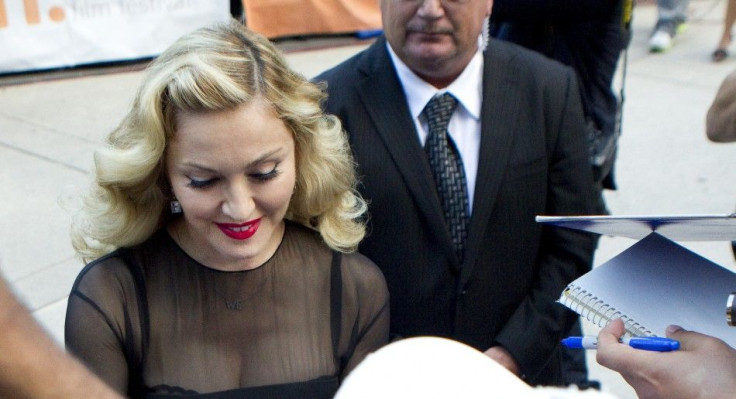Women directors shine at Toronto film festival

Madonna may have stolen the lion's share of the headlines, but there were plenty of films by women directors earning a lot of buzz at this year's Toronto International Film Festival, which draws to a close on Sunday.
From the invention of the vibrator to the aftermath of a school massacre, women brought comedy and complexity to the event that helps launch Hollywood's Oscar season.
From Madonna's W.E. to Sarah Polley's Take This Waltz, many of the films delved into familiar themes of relationships, marriage and children, but it is unfair to label them as chick flicks, said Canadian actress and director Polley.
If you make a movie about a woman, whether it's by a woman or from the perspective of woman, then it's (labeled) a 'chick flick,' she said. But there's no matching marginalizing term to talk about a movie that stars a man.
I guess if it's from a man's perspective and a man directs it, it gets to just be a movie, Polley added.
Her new feature, Take This Waltz, was one of three female-helmed films to get a high-profile gala screening at the festival. The movie stars Michelle Williams as a young married woman tempted into a relationship by a handsome neighbor.
Madonna's W.E., about the 1930s marriage of King Edward VIII and American divorcee Wallis Simpson, was also given the gala treatment, although headline-grabbing talk about the pop star outweighed the interest paid to her film.
And Tanya Wexler's crowd-pleasing Victorian vibrator comedy Hysteria rounded out the top-billed female films at Toronto.
Wexler, returning to the director's seat after taking a few years off to focus on her family, said the goal with Hysteria was to make a romantic comedy that women would want to see, but that also had a message.
This movie peeks at the idea of having the opportunity to choose, said Wexler. It's really about being in charge of yourself, your life and your body.
She added that despite all the advances women have made since the Victorian era, inequality and lack of choice remain issues for many women in all parts of the world.
It's the difference of my kids saying 'that's not fair' if they don't each have seven jelly beans, said Wexler. And the ability to choose if you want jelly beans or chocolate chips.
On the sales front, Andrea Arnold's bare bones adaptation of Wuthering Heights and Malgoska Szumowska's Elles both secured distribution deals. Lynn Shelton's comedy Your Sister's Sister, which mulls family, friendship and sex, was snapped up by IFC Films for distribution in the Americas and also tied up European and Australian deals.
I did hear a couple of people say, 'it's like a really smart chick flick,' said Shelton. I don't really think it is. I've had so many men say that they just adore it.
OSCAR BAIT?
While Shelton's heartfelt turn is being called the sleeper-hit of this year's festival, the low-budget comedy is probably a stretch for major award contention.
More likely candidates at 2011's festival that could pop up on Hollywood's awards circuit include Agnieszka Holland's holocaust drama In Darkness and Lynne Ramsay's disturbing take on a school massacre in We Need to Talk About Kevin.
Neither film has the broad appeal of Kathryn Bigelow's The Hurt Locker, the 2009 war drama that made her the first woman ever to win an Oscar for Best Director, but both could be winners in other categories.
Tilda Swinton's performance as a tortured mother in We Need to Talk About Kevin could net the actress an Oscar nod, while Holland's In Darkness has already been put forward as Poland's official entry for Best Foreign Language Film.
Holland, who has made over a dozen features, said it is challenging for women to make award contenders as they are often pigeonholed by the studio system into romantic comedies.
It's certainly easier to convince the producers to give you the money for this kind of material, she said. If a woman comes with something that is more edgy, it is not obvious that she will be considered as a candidate to direct.
For Polley, the sheer number of female-driven films at this year's festival is a sign that that this may be changing. She said that having had the opportunity as an actress to work with women directors was definitely instrumental in her move behind the camera, and she hopes to inspire others.
I think it's a huge thing to have role models, she said I worked with Kathryn Bigelow and Isabel Coixet, and I remember going, 'oh, it's normal for women to direct films.'
© Copyright Thomson Reuters 2024. All rights reserved.





















